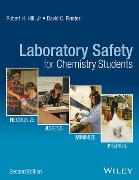Laboratory Safety for Chemistry Students
BücherAngebote / Angebote:
A unique approach to keeping you safe in the lab throughout your undergraduate education and beyond
Laboratory Safety for Chemistry Students is unlike any other college textbook you've ever seen. It's designed to accompany you throughout your four-year undergraduate education and beyond, teaching you the skills and knowledge you need to learn your science and stay safe while you're working in the lab and the new edition aligns with the revised safety instruction requirements from the ACS Committee on Professional Training 2015 "Guidelines and Evaluation Procedures for Bachelor's Degree Programs". The book is organized around four core principles of safety (RAMP):
* Recognizing hazards
* Assessing risks of hazards
* Minimizing the risks of hazards
* Preparing for emergencies
Each of the book's eight chapters is organized into three tiers of sections, with a variety of topics suited to introductory, intermediate, and advanced courses. This enables you to learn the relevant safety information you need for your particular course level. Each section begins with a brief description of a laboratory incident that illustrates the importance of the topic. A multiple choice quiz concludes each section to help you assess your grasp of the topic. Throughout the text, "Chemical Connections" illustrate how chemical principles apply to laboratory safety. In addition, "Special Topics" explore additional safety issues relevant to particular sections.
As you progress through the text, you'll learn everything you need to know to stay safe in the lab, from the
latest "best practices" in chemical lab procedures to up-to-date explanations of the laws and regulations related to laboratory safety. Most importantly, you'll learn how to identify and manage safety concerns before they can do harm.
Robert H. Hill, Jr, PhD, has more than thirty years of experience working in the occupational and environmental health community at the Centers for Disease Control and Prevention (CDC). He has worked in the CDC research laboratories of the National Institute for Occupational Safety and Health and the National Center for Environmental Health. Dr. Hill has also worked in the Office of Health and Safety, serving as acting director, and presently works part time for Battelle Memorial Institute in Atlanta. He is involved with American Chemical Society (ACS) Committee on Chemical Safety (former Chair) and with the ACS Division of Chemical Health and Safety (former Chair). He is on the Board of Editors of the Journal of Chemical Health and Safety. He has a great passion for lab safety and for preventing lab incidents.
David C. Finster, PhD, is Professor of Chemistry at Wittenberg University, where he has served as chair of the Chemistry Department. He is the university's Chemical Hygiene Officer and a Certified Chemical Hygiene Officer (NRCC, 1999). He is a member of the American Chemical Society (ACS) Committee on Chemical Safety and chair of the Safety Committee in the Division of Chemical Education. He is on the Board of Editors of the Journal of Chemical Health and Safety. He has presented numerous talks and workshops on the application of intellectual development theory to learning science and chemistry and has been a volunteer firefighter and hazmat technician for many years. Cover Credit: Amil Anderson
Lieferbar in ca. 10-20 Arbeitstagen

